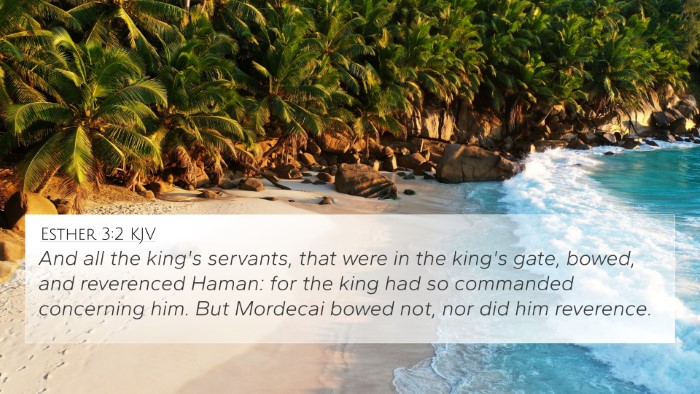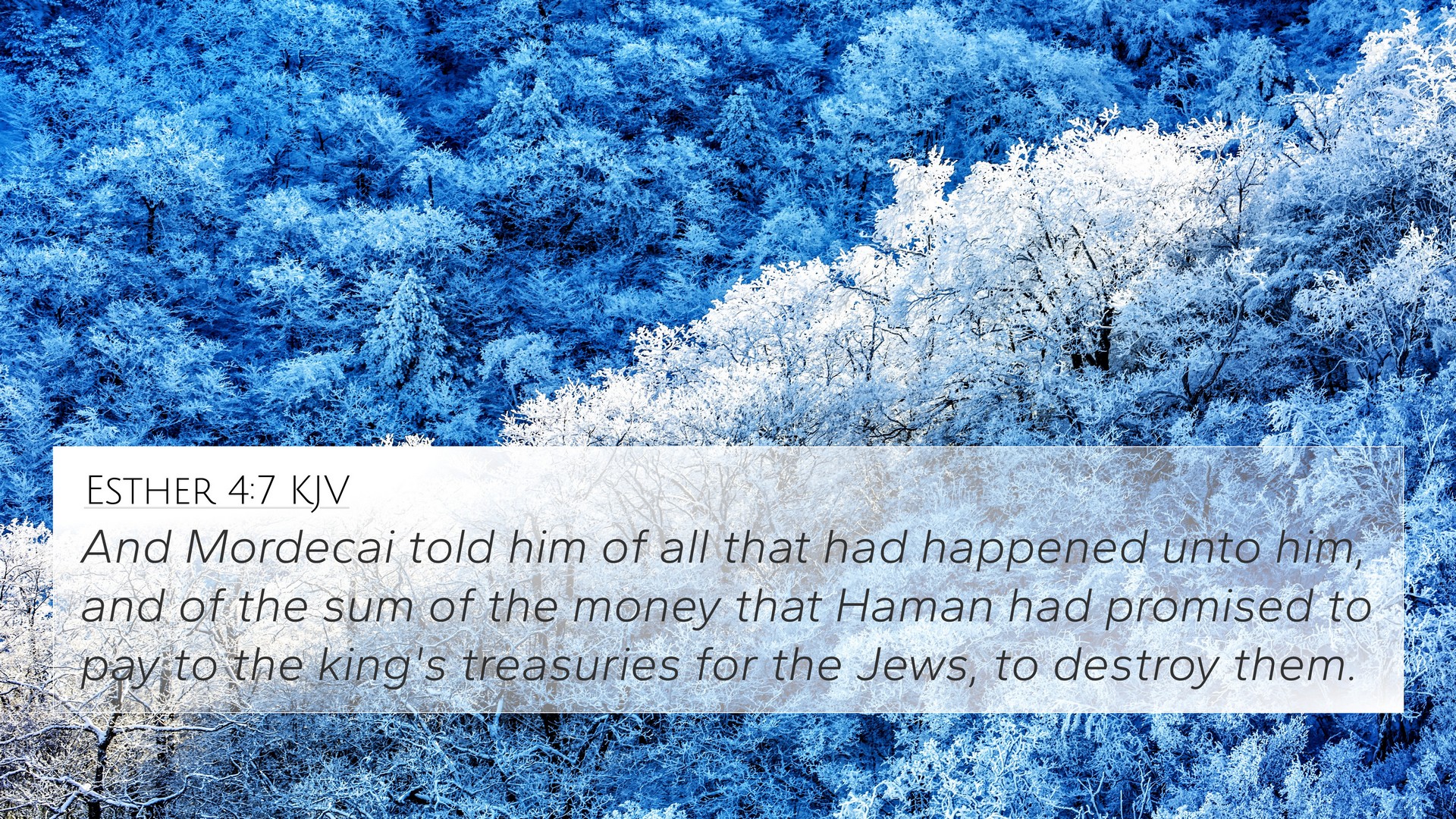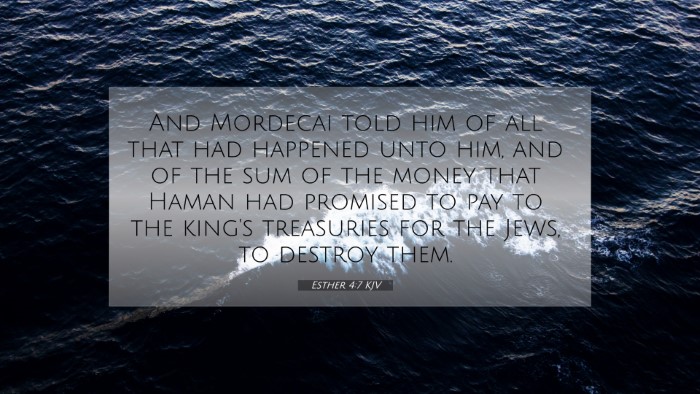Old Testament
Genesis Exodus Leviticus Numbers Deuteronomy Joshua Judges Ruth 1 Samuel 2 Samuel 1 Kings 2 Kings 1 Chronicles 2 Chronicles Ezra Nehemiah Esther Job Psalms Proverbs Ecclesiastes Song of Solomon Isaiah Jeremiah Lamentations Ezekiel Daniel Hosea Joel Amos Obadiah Jonah Micah Nahum Habakkuk Zephaniah Haggai Zechariah MalachiEsther 4:7 Similar Verses
Esther 4:7 Cross References
And Mordecai told him of all that had happened unto him, and of the sum of the money that Haman had promised to pay to the king's treasuries for the Jews, to destroy them.
Uncover the Rich Themes and Topics of This Bible Verse
Listed below are the Bible themes associated with Esther 4:7. We invite you to explore each theme to gain deeper insights into the Scriptures.
Esther 4:7 Cross Reference Verses
This section features a detailed cross-reference designed to enrich your understanding of the Scriptures. Below, you will find carefully selected verses that echo the themes and teachings related to Esther 4:7 KJV. Click on any image to explore detailed analyses of related Bible verses and uncover deeper theological insights.

Esther 3:2 (KJV) »
And all the king's servants, that were in the king's gate, bowed, and reverenced Haman: for the king had so commanded concerning him. But Mordecai bowed not, nor did him reverence.
Esther 4:7 Verse Analysis and Similar Verses
Esther 4:7 states: "And Mordecai told him of all that had happened unto him, and of the sum of the money that Haman had promised to pay to the king's treasuries for the Jews, to destroy them." This verse comes amidst a time of great distress for the Jewish people in Persia, as Haman's wicked plot against them has been uncovered. Here, Mordecai reveals the seriousness of the situation to Esther through her messenger.
Interpretation and Meaning
The essence of this verse encapsulates themes of faithfulness, urgency, and the moral responsibility we hold in times of crisis. Through public domain commentaries, we can glean several layers of meaning from this text.
Insights from Matthew Henry
Matthew Henry emphasizes the courage and integrity of Mordecai in bringing Esther up to speed regarding the dire circumstances facing their people. He notes that Mordecai's actions serve not just as a mere report but as a clarion call to action for Esther, urging her to recognize the precarious situation they are in as a Jewish community.
Albert Barnes' Perspective
Albert Barnes adds that Mordecai's mention of the sum of money offered by Haman signifies the depth of Haman's malice and the lengths he is willing to go to ensure the annihilation of the Jews. This financial aspect showcases how justice and evil can intertwine, as the wealth promised by Haman is contrasted with the innocent lives at stake.
Adam Clarke's Commentary
Adam Clarke provides further elaboration on the context surrounding this verse, highlighting the lack of awareness that Esther has about Haman's plot. Clarke notes that Esther's role is pivotal; her decisions will influence the fate of many, emphasizing that individuals in positions of influence must act with wisdom and courage.
Cross-References
Esther 4:7 connects to several other key Bible verses that enrich our understanding of the themes involved:
- Esther 3:11 - Haman's plot and decree against the Jews.
- Esther 4:14 - A call to action for Esther: "Who knows whether you have not come to the kingdom for such a time as this?"
- Psalm 121:7-8 - Assurance of God’s protection over His people.
- Proverbs 21:1 - "The king's heart is a stream of water in the hand of the Lord; He turns it wherever He will." This highlights God's sovereignty in human affairs.
- Daniel 3:16-18 - The three Hebrew boys show faithfulness under persecution.
- Romans 8:31 - "If God is for us, who can be against us?" An assurance for believers in perilous situations.
- James 1:27 - True religion involves caring for the oppressed, urging action when injustice arises.
Thematic Connections
This verse serves as a poignant reminder of the connections between Bible verses related to injustice and the responsibility to stand against it. It evokes a sense of inter-Biblical dialogue where Esther's encounter with Mordecai brings Markable parallels to other Biblical narratives where individuals are called to act despite personal risks.
Linking Bible Scriptures
In exploring the thematic Bible verse connections, we see that like Esther, many in Scripture are thrust into positions of influence during times of turmoil. The comparative Bible verse analysis leads us to consider how Esther’s response can be juxtaposed with the responses of other Biblical individuals such as Daniel, Joseph, and Nehemiah.
Conclusion
Esther 4:7 acts as a catalyst in the narrative, revealing layers of human emotion intertwined with divine purpose. The insights from esteemed commentaries combined with cross-references and thematic explorations deepen our understanding of why this verse matters to both the historical narrative and to us today. In examining the Bible verse parallels presented in Esther's story, we gain a greater perspective on God's providential care and the active role believers are called to play in times of need.


